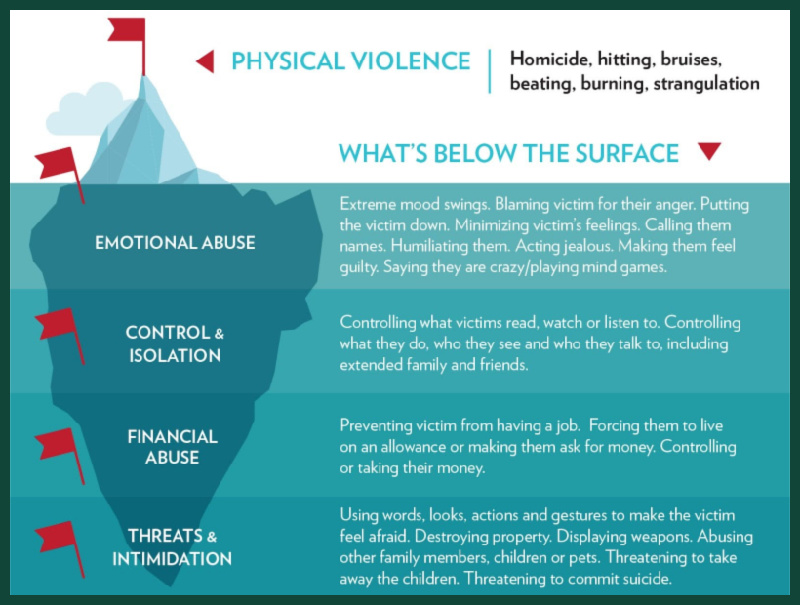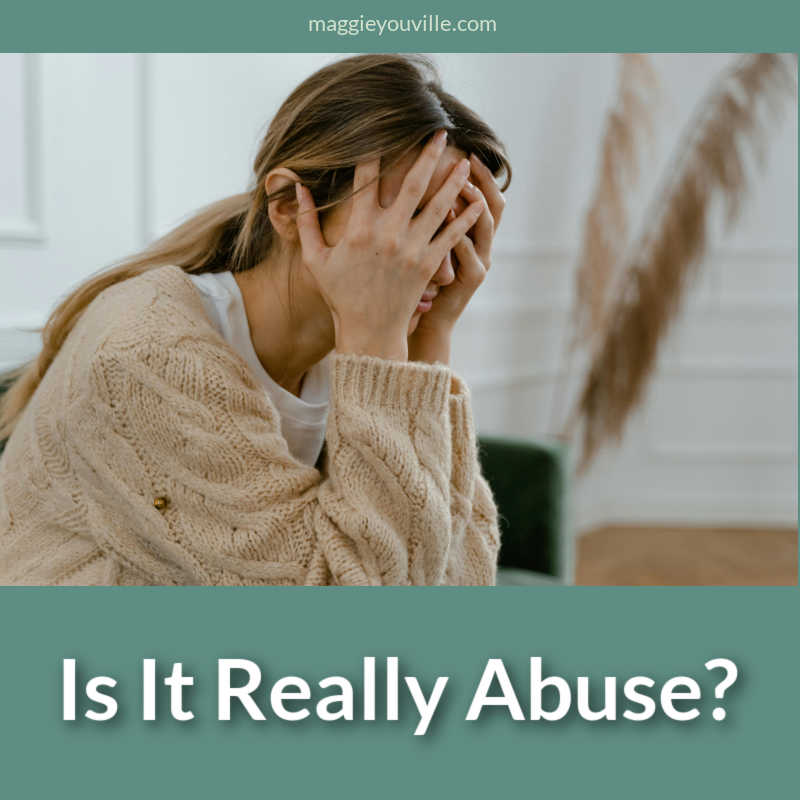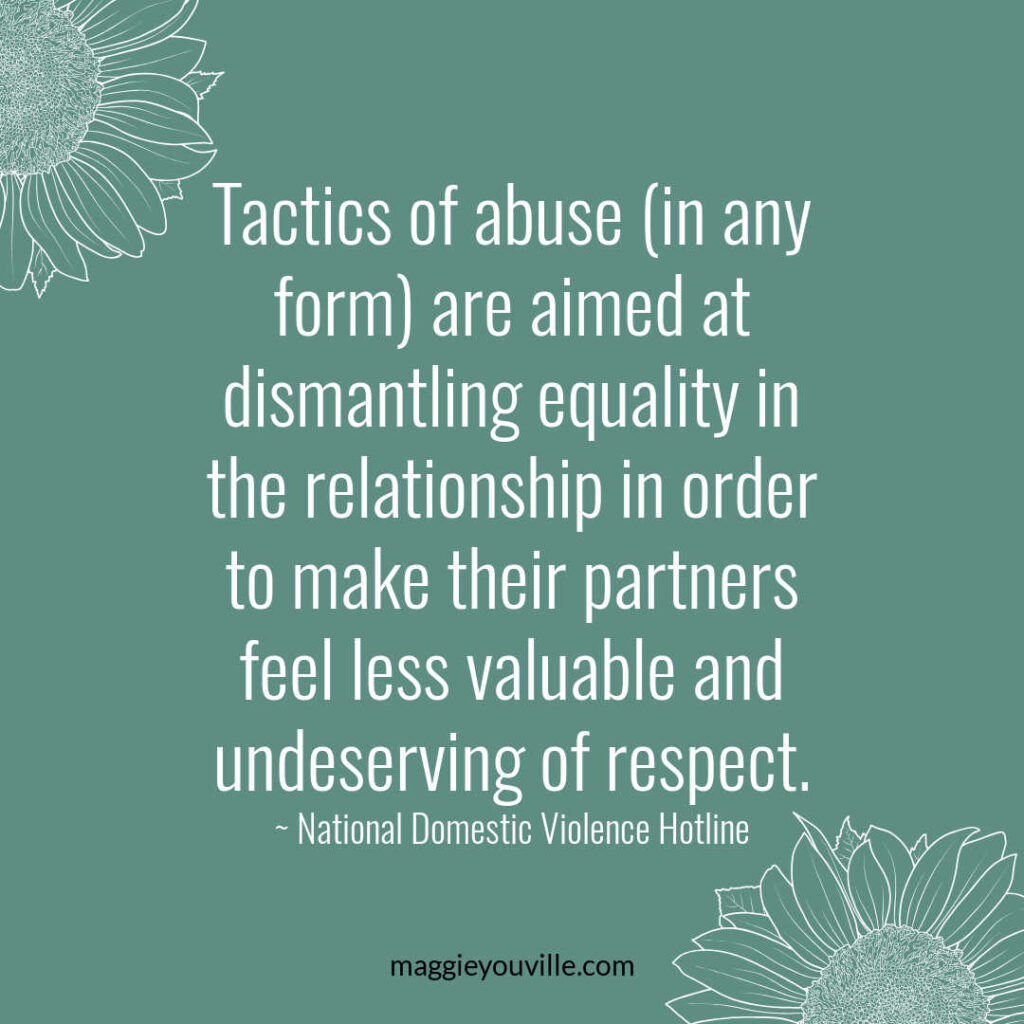When you hear the words “abuse,” “abuser,” or “abusive relationship,” what do you think of? A celebrity trying to hide her bruises behind makeup and sunglasses? A drunken man screaming at his wife and kids? A priest taking advantage of the altar servers or music ministers?
While those scenarios are all abuse, most abuse is much more subtle and sinister than that. Many of us think we’d never let ourselves be abused or we’d never stand by while someone near us was being abused. Those statements assume abuse is obvious… and often, it is not.
Abuse can take many forms besides physical abuse or sexual abuse. There is also verbal abuse, emotional abuse, psychological abuse, financial abuse, spiritual abuse, and legal abuse. Often, these forms of abuse work together. Physical abuse is often described as the “tip of the iceberg,” the visible abuse that indicates other forms of abuse are likely hiding below the surface, unseen:

However, many women experience other forms of abuse without ever experiencing physical abuse. This often causes them (and others) to question whether they are really being abused. They may think, “If he never hits me, it’s not abuse.” The reality is that unseen forms of abuse are just as harmful as physical abuse.
Why is abuse hard to see?
Abusers are often the nicest people you’ll ever meet. Magnifico in Disney’s animated movie Wish would give the clothing off Benito’s back if you needed it and he’d be the first to volunteer Henry if your home was to crumble. Behind that dashing smile and facade of generosity, however, is a man who is using his people’s wishes for his own selfish ends.
When Catherine met her husband, he was helping with the youth group on Friday nights, singing in the choir on Sunday mornings, and involved in the Knights of Columbus. He never hit her and he never raised his voice, but he also refused to let her know anything about the family finances, regularly told her she was plain and unattractive, and expected her to do all the childcare and housework. At church, he looked like the perfect Catholic dad; at home, he was financially, verbally and psychologically abusive.
We all have a tendency to believe what we see. When a woman tells us that her husband acts differently behind closed doors than he does in church, it may be hard to believe her. It may even be hard for her to believe this. His facade can cause a great deal of confusion about why he treats her so poorly at home when he’s so nice to everyone else at church.
In her new podcast about spiritual and sexual abuse, Sister Danielle Victoria shares, “It isn’t about obvious violence. It was subtle, quiet, the kind of violence that hides behind appearances that seem holy, both to you and to everyone around you. The kind of violence that confuses you into silence and makes you question your reality. But subtle does not mean harmless. What happens in the shadows can leave wounds just as deep as anything done in the light.”
She and another religious sister share their story of being groomed by a beloved priest in their order. She talks about Father Dave’s charisma and popularity with their sisters, which made her question little moments in which he crossed boundaries with her or shared something that seemed odd. She says, “What happened to us and to many others did not look like violence. It didn’t involve force or threats, but it was abuse all the same.”
We may also fail to see abuse because it is so common. Despite a growing awareness about bullying, abuse, harassment, and other topics, people treat other people badly everywhere. If we’ve grown up in a family where abuse was common but not identified, we accept that as normal and fail to see it in our own relationships or others’ relationships. The girl who is treated poorly by her friend group may accept that same treatment from her boyfriend who becomes her husband and never changes how he treats her. The man who is abused by his boss may come home and dish out the same abuse and harshness to his wife and kids.
Excuses for Abuse
Often, we make excuses for the way those closest to us treat us. We may say, “He just has an anger problem” or “She’s having a bad day.” Perhaps we attribute the abuse to stress or mental health problems. Or we may blame ourselves for the abuse, saying he wouldn’t have yelled at me if I’d done what he asked, if I’d asked more gently, if I’d…
After making the decision to leave her abuser, Joan said, “My mind is reeling from it all… on Tuesday morning I still had doubts that I was in a ‘real’ verbally abusive relationship (versus a marriage with just simply a difficult person prone to angry outbursts because of his anxiety) BUT by the evening I knew it was the former.”
These excuses erase an abuser’s responsibility for their actions or place responsibility for their actions in the wrong place. Each of us is responsible for our own actions and how we treat those around us. Joan’s husband is responsible for his unkind words and angry outbursts, not Joan. While none of us is perfect, abusers display a pattern of behaviour that separates their actions from those of a healthy person.
A healthy person will apologize for their mistakes or wrong actions and then show by changed actions (or genuine attempts at changed actions) that they really are sorry. An abuser never apologizes or only apologizes in such a way that shifts the blame from him to the victim, and then does nothing to change his actions so that the harmful actions are repeated again in the future.
Often, this dichotomy between an abuser’s words and actions creates even more confusion for the victim. He said he was sorry for yelling at me, but he’s still yelling at me. He said he understood that I felt unloved when he dismisses my ideas, but he’s still doing that. We can be endlessly hopeful and trusting, believing that our partner will do what he says, and then wondering why he isn’t able to change as he has promised to do over and over and over again.
Marriage advice to women from well-meaning Catholics can add to this confusion. She’s told to forgive 70 times 7 times, so when her husband comes to her, once again asking for forgiveness for having lost his temper, she forgives. She’s told to use “I statements” and to speak gently and to submit to him, and so she tries to do all these, and yet he still doesn’t trust her with the credit card or the car. This advice also shifts the responsibility for the harmful actions from the abuser to the victim. She needs to be reminded that she is not responsible for another person’s actions and that forgiveness does not guarantee or even require reconciliation.

Why do abusers abuse?
Abuse comes from one person’s desire to control another person. Abusers believe they have the right to control another person’s life, whether that’s telling another person what they can or cannot do, physically preventing a person from leaving or doing something, limiting finances, controlling conversations, isolating the person, etc. The abuser believes his feelings or needs should be prioritized over the other person’s feelings and needs at all times and at all costs.
The National Domestic Violence Hotline notes that, “Tactics of abuse (in any form) are aimed at dismantling equality in the relationship in order to make their partners feel less valuable and undeserving of respect.”
This goes directly against Catholic social teachings. As Catholics, we believe that men and women are created equal and that all people are equal in dignity. We are all beloved children of God, and we should never make another person feel less valuable, disrespected, or unloved. The Catechism of the Catholic Church states, “Man and woman have been created, which is to say, willed by God: on the one hand, in perfect equality as human persons; on the other, in their respective beings as man and woman. ‘Being man’ or ‘being woman’ is a reality which is good and willed by God: man and woman possess an inalienable dignity which comes to them immediately from God their Creator. Man and woman are both with one and the same dignity ‘in the image of God’.” (emphasis added)
Let’s return to our original question, is it really abuse? and rephrase that. Does it make one person in the relationship less valuable than the other? Any actions that devalue another person, that fail to treat two people in the relationship as equals, or that disrespects one partner, are abusive. This can include words and actions but also things that are not said or not done, as we confess in the beginning of Mass.
Remember that abuse is a pattern of behaviour, and often that pattern becomes worse. Abusers don’t begin by abusing their victims. There are often red flags from the very beginning of the relationship, but those red flags are few and far between in the dating days, and easy to overlook because other parts of the relationship are so exciting or good or new. Many women in abusive relationships find that the abuse becomes more obvious after the wedding or after the birth of their first child, and then simply keeps getting worse from there.
Maybe instead of asking “is it really abuse?” we should ask, “Does he make me feel valued and loved and respected? Does he show me that he appreciates me for who I am? Does he apologize when he makes a mistake? Does he communicate openly with me about what he’s thinking and feeling? Does he ask for my ideas and actually consider or accept them? Does he share the work of parenting our children and maintaining our home? Do we talk openly about our money and how we use it? Do I feel safe with him?”
If the answer to these questions is no, then the answer to, “Is it really abuse?” is likely yes.

If you are still asking yourself if it’s abuse, we highly recommend these resources (affiliate links):
- The Emotionally Destructive Marriage: How to Find Your Voice and Reclaim Your Hope by Leslie Vernick (includes an abuse questionnaire to help you discern whether your relationship is emotionally destructive)
- Is It Me? Making Sense of Your Confusing Marriage: A Christian Woman’s Guide to Hidden Emotional and Spiritual Abuse by Natalie Hoffman.
- @healingbythenumbers on Instagram has a series of reels (see highlights) about “That Was Abuse” in which she highlights little things she overlooked in her relationship that were actually abusive and harmful.
Leave a Reply